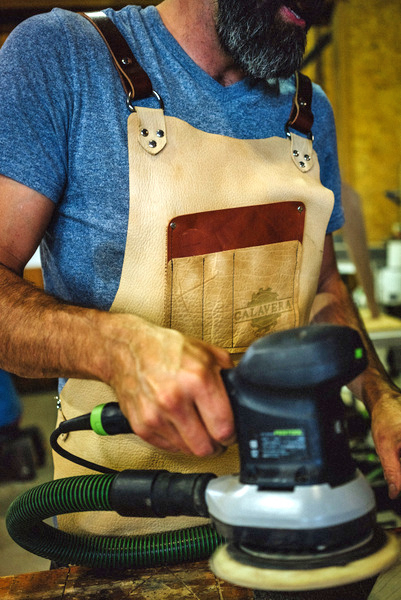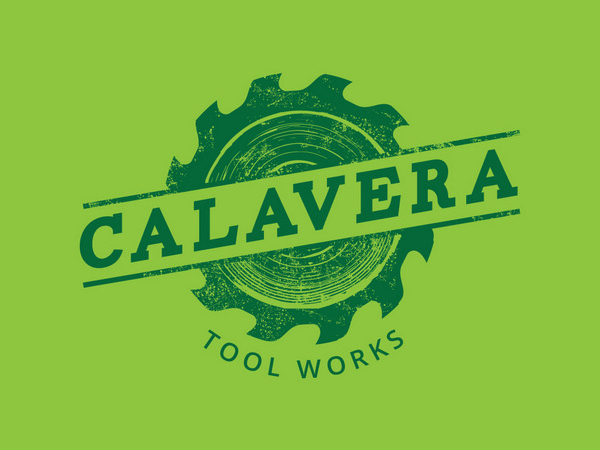
New tools and accessories fill the pages of our “What’s In Store” department in every print issue of Woodworker’s Journal and our weekly eZine. But when’s the last time you can recall seeing a single new idea to help get you and your shop better organized? Try to think of something other than the latest version of multi-drawer steel tool chest on wheels… Tough to land on a product, isn’t it? While there’s always a new pneumatic nailer, a more powerful battery or another band saw coming to market, innovation in the sphere of shop organization and personal woodworking apparel very rarely happens.

So imagine my surprise when, shortly before Christmas, a box arrived containing four small black nylon gear bags with bright-orange carabiners attached. Plus a pair of extruded aluminum brackets on which to mount these bags. But this gear, looking more suited to geo trekkers or mountain climbers at base camp, is actually intended for jobsite folks and us woodworkers. Their source: a new Indiana-based startup company called Calavera Tool Works, founded by Michael O’Shaughnessy Williams.
He sums up these “5# Gear Bags” this way: “At their core, they’re super durable, easy-to-attach little bags that can be filled, stuffed, thrown, dropped, dragged or whatever else have you, and still be extremely useful pieces of gear at the end of the day.”
Williams has spent most of his life around construction sites, hardware stores and power tools. He earned a degree in industrial design and an MBA from Notre Dame, then developed power tools for Stanley Bostitch and Bosch, where he led the benchtop power tools group.
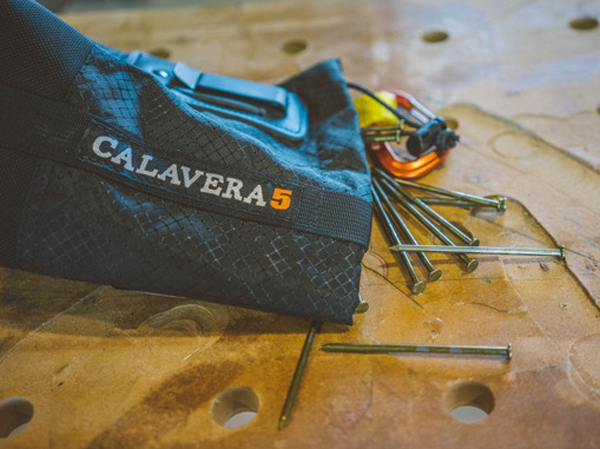
“I had these opportunities — dream jobs by just about any standard, not because I’m particularly smart, but because there’s not one other person in the world who loves this stuff more than me.”
Career pursuits led him from Bosch to Festool North America to lead the division’s marketing, product management and training efforts, up until about two years ago. Williams explains that his decision at that point to leave Festool was motivated by the desire to start his own company where he could be the one to make all the decisions impacting the finished product and to set high standards for customer service. What he had in spades was motivation. What he lacked, initially, was clarity about what to make.
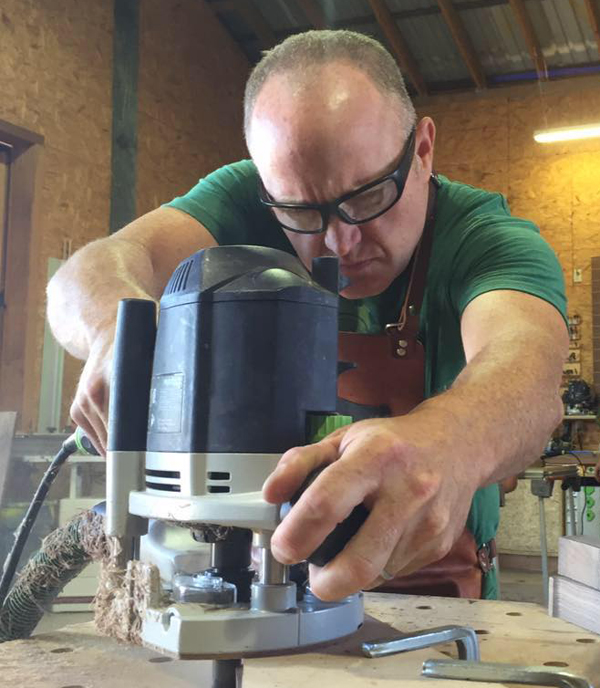
“When I got (Calavera) started, all I could think about was making really great tool belts … rethinking how people go about organizing, carrying and storing their tools and supplies.”
The typical mindset and approach of contractors, Williams says, is a “carry-every-single-thing-you’ve-got” approach. “I’ve seen guys carrying around 40 lb. tool belts loaded with junk from three jobs back.”
When those overloaded tool belts get emptied, the mishmash of fasteners and other odds and ends often goes straight into the trash — or the “tetanus bin” as many call it. Small quantities of fasteners and supplies are rarely kept sorted, either while in the tool belt or after getting dumped from it. When supplies unexpectedly run out, time gets lost running to the store rather than staying productive on the site. For many busy contractors, organization becomes afterthought, not an operating objective.
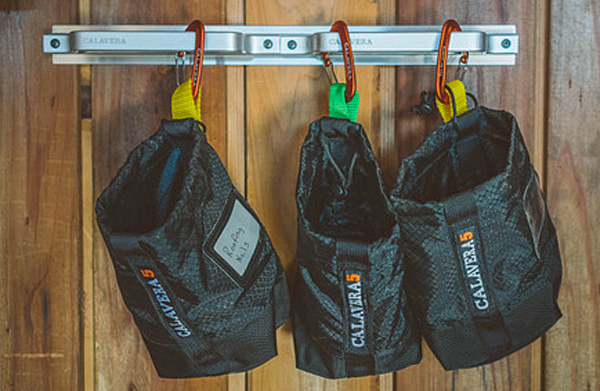
Williams’s new-product epiphany came one day while spending time with his kids at a climbing wall. It occurred to him that climbers’ chalk bags offer a compact efficiency and convenient attachment system for folks who can’t afford to be weighed down or burdened by excess gear. Could that same “take just what you need” mindset translate to the jobsite or woodshop? It was worth a try.
“The day that the idea for the 5# Gear Bag struck, I dusted off the 40-year-old sewing machine my mom gave me 20 years ago and set to learning how to use it. I probably made 300 (prototypes) myself before settling on the final design we have now,” he admits.
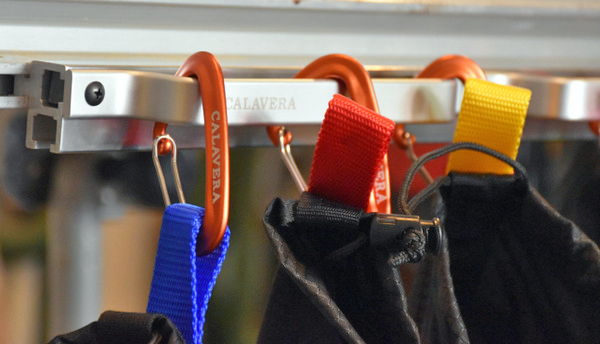
The size of these bags roughly approximates the proportions of the 5-lb. brown bags in which hardware stores used to sell bulk nails or screws. Snap-on carabiners offer quick connection to a pipe, screw or whatever attachment surface is nearby. The bags also have an integrated belt clip and internal drawstring closure. Calavera’s aluminum bracket system, packaged with the bags, enables them to be mounted to a bench, sawhorses or a cabinet. The top multipurpose bar of the bracket can be moved from one base bracket to another, depending on where you need your supplies to be for different jobs.
“Now you can have your supplies within easy reach but not on top of your work surface where you’re trying to get work done!”
While the 5# model is the only size currently available, Calavera plans to offer 1# to 10# sizes as well.
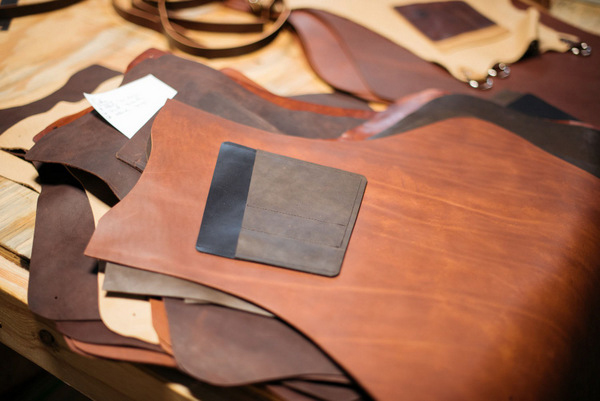
In addition to the new Gear Bags, the company also manufactures four styles of leather Work Aprons, which Williams hopes will come as a welcomed solution for woodworkers. While carpenters have a myriad of quality tool belts from which to choose, personal shop apparel for woodworking is limited. And most woodworkers, with the exception of Norm Abram, just don’t wear tool belts.
Williams studied the work habits of professional woodworkers in order to match function to form in these aprons. Made of several grades of leather, ranging from supple to stiff, the aprons feature just a few breast pockets to keep them “streamlined,” he explains. There’s a place for a pencil, notepad or phone, a 6-in. ruler and maybe a small square. But, he’s steered clear of big pockets around the waist to minimize bulk storage there — an apron shouldn’t be a tool belt, after all. These handmade aprons are available in several sizes, plus three adjustable strap options to suit personal preference and body type.
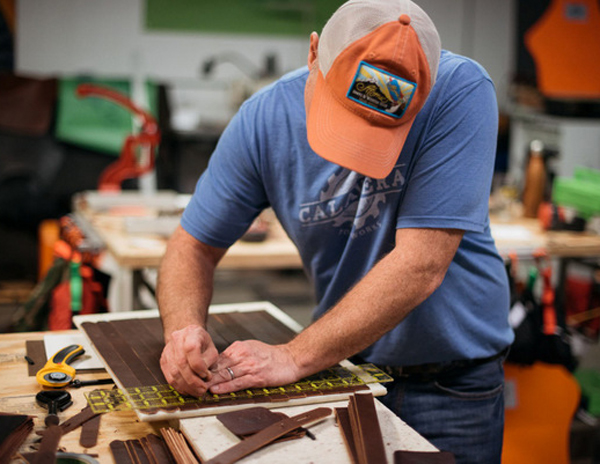
“I have logged more miles than I care to remember visiting tanneries and leather shops around the country in search of the perfect materials for the main panels, pockets and straps,” Williams admits. “I think the materials give us an excellent range of fit, feel, color and character. Some will want one that feels soft and broken in right out of the gate, while others will want the satisfaction of breaking in our hand-dyed model that starts out stiff as a board.”
At these early stages of operation, Calavera is very much a family affair. Williams cuts and hand-dyes every component of the top-end Work Aprons, and he says his four kids can regularly be found in the shop pitching in with organizing, packaging and label-stitching tasks.
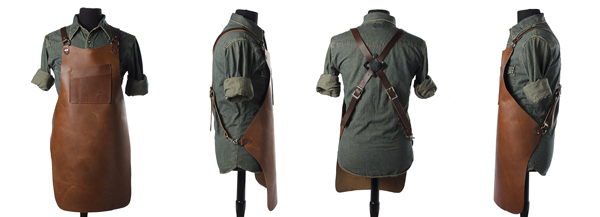
What Williams can’t do himself is outsourced to other American companies, and Williams is committed to a “Made in America” business ethic. He admits that the entire product line could have been launched much earlier last year if he had sourced the manufacturing overseas. But that alternative was out of the question.
“It seemed disingenuous to me to build a company around my love for the American craftsman by sourcing all of my products in foreign factories. Plus, once I got past the learning curve, I found a wealth of domestic sources ready and waiting to start cranking out some really great finished products.”
As the 5# Gear Bags and Work Aprons continue to gain exposure in the marketplace, there’s much in store from Calavera this year. Williams teases that the company will be rolling out more sizes, colors and configurations of the Gear Bag line, with camo being his personal favorite. He plans to borrow even more design inspiration from the backpacking and climbing industries and expand the storage bar system, too.
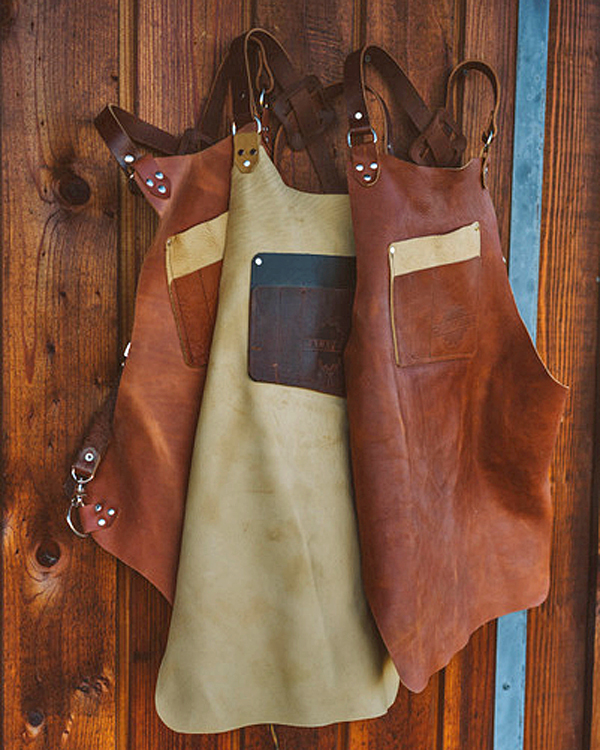
In the meantime, Williams is overwhelmed by the reception the 5# Gear Bags and Work Aprons are receiving, and he says both jobsite and woodworking customers are beginning to embrace Calavera’s concept of “take what you need for the task at hand, and leave the rest.” It’s a new kind of practicality, rooted in quality products, with many more possibilities to explore.
“There’s simply no way to overstate how good it feels to step outside the boundaries of comfort and chart your own course, to see ideas become reality, and then to see those things you’ve created become useful and valuable tools in the hands of end users,” Williams says. “It’s not for the validation, but because this will enable us to push forward with a much broader plan to bring innovation to our industry.”
Learn more about Calavera Tool Works products by clicking here.
